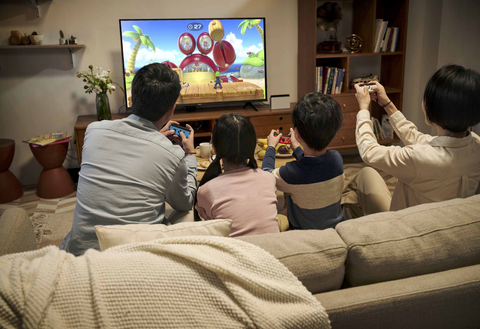Unveiling the Digital Dilemma: Playing Games, Watching TV, and the Sluggish Spiral
In today's digital age, we are surrounded by a plethora of entertainment options that provide instant gratification and endless hours of amusement. From immersive video games to captivating television shows, these activities offer an escape from the realities of life. However, indulging excessively in gaming and binge-watching can lead to unintended consequences, including feeling sluggish and lethargic. In this article, we delve into the effects of excessive game playing and TV watching, explore the reasons behind the sluggishness that ensues, and provide tips for a more balanced digital lifestyle.

The Allure of Digital Entertainment:
Playing video games and watching television have become deeply ingrained in our modern culture. The seamless integration of technology into our lives has made access to these forms of entertainment easier than ever before. The captivating narratives, stunning visuals, and interactive experiences offered by video games, as well as the addictive and binge-worthy nature of TV series, keep us hooked for hours on end.

The Sluggish Spiral:
Although indulging in gaming and TV can provide temporary pleasure, excessive engagement often leads to a cascade of negative effects. One of the most prevalent consequences is the feeling of sluggishness. Spending long hours seated, being mentally engaged yet physically sedentary, and neglecting other aspects of life can contribute to a lack of energy, reduced motivation, and overall lethargy.
Sedentary Lifestyle and Physical Health:
Prolonged periods of gaming and TV watching usually involve extended periods of sitting or lying down. This sedentary behavior not only affects our physical health but also hampers our mental well-being. Lack of physical activity can lead to weight gain, muscle atrophy, poor cardiovascular health, and increased risk of chronic conditions like obesity and diabetes. Additionally, a sedentary lifestyle can have a negative impact on mental health, causing symptoms of anxiety, depression, and overall low mood.
Cognitive Overload and Mental Exhaustion:
Engaging in intensive gaming sessions or binge-watching marathons requires significant mental focus and concentration. The continuous stimulation bombards the brain with information, leading to cognitive overload. Over time, this overload can result in mental exhaustion, making it difficult to concentrate on other tasks, diminishing productivity, and contributing to a constant state of fatigue.
Neglecting Other Life Aspects:
Excessive gaming and TV consumption can lead to neglecting other important areas of life, such as social interactions, personal relationships, academic or professional responsibilities, and self-care. The time spent absorbed in digital entertainment can disrupt the balance necessary for a healthy and fulfilling life, ultimately leaving individuals feeling unfulfilled and disconnected from their surroundings.
Strategies for a Balanced Digital Lifestyle:
Set Time Limits: Establish specific time limits for gaming and TV watching to avoid excessive indulgence. Create a schedule that allows for dedicated time to enjoy these activities while ensuring ample time for other responsibilities and hobbies.
Engage in Physical Activity: Incorporate regular physical exercise into your routine to counteract the sedentary nature of gaming and TV watching. Engaging in activities like walking, jogging, or joining a sports club can boost energy levels, improve overall fitness, and enhance mental well-being.
Practice Mindfulness: Take breaks during gaming or TV sessions to practice mindfulness techniques such as deep breathing, stretching, or meditation. This can help alleviate mental exhaustion, increase focus, and enhance overall mental clarity.
Prioritize Social Interactions: Dedicate time to nurturing personal relationships and engaging in social activities. Plan outings, game nights, or movie sessions with friends and loved ones to strike a balance between digital entertainment and real-world connections.
Explore Diverse Hobbies: Expand your interests beyond gaming and TV

The Allure of Digital Entertainment:
Playing video games and watching television have become deeply ingrained in our modern culture. The seamless integration of technology into our lives has made access to these forms of entertainment easier than ever before. The captivating narratives, stunning visuals, and interactive experiences offered by video games, as well as the addictive and binge-worthy nature of TV series, keep us hooked for hours on end.

The Sluggish Spiral:
Although indulging in gaming and TV can provide temporary pleasure, excessive engagement often leads to a cascade of negative effects. One of the most prevalent consequences is the feeling of sluggishness. Spending long hours seated, being mentally engaged yet physically sedentary, and neglecting other aspects of life can contribute to a lack of energy, reduced motivation, and overall lethargy.
Sedentary Lifestyle and Physical Health:
Prolonged periods of gaming and TV watching usually involve extended periods of sitting or lying down. This sedentary behavior not only affects our physical health but also hampers our mental well-being. Lack of physical activity can lead to weight gain, muscle atrophy, poor cardiovascular health, and increased risk of chronic conditions like obesity and diabetes. Additionally, a sedentary lifestyle can have a negative impact on mental health, causing symptoms of anxiety, depression, and overall low mood.
Cognitive Overload and Mental Exhaustion:
Engaging in intensive gaming sessions or binge-watching marathons requires significant mental focus and concentration. The continuous stimulation bombards the brain with information, leading to cognitive overload. Over time, this overload can result in mental exhaustion, making it difficult to concentrate on other tasks, diminishing productivity, and contributing to a constant state of fatigue.
Neglecting Other Life Aspects:
Excessive gaming and TV consumption can lead to neglecting other important areas of life, such as social interactions, personal relationships, academic or professional responsibilities, and self-care. The time spent absorbed in digital entertainment can disrupt the balance necessary for a healthy and fulfilling life, ultimately leaving individuals feeling unfulfilled and disconnected from their surroundings.
Strategies for a Balanced Digital Lifestyle:
Set Time Limits: Establish specific time limits for gaming and TV watching to avoid excessive indulgence. Create a schedule that allows for dedicated time to enjoy these activities while ensuring ample time for other responsibilities and hobbies.
Engage in Physical Activity: Incorporate regular physical exercise into your routine to counteract the sedentary nature of gaming and TV watching. Engaging in activities like walking, jogging, or joining a sports club can boost energy levels, improve overall fitness, and enhance mental well-being.
Practice Mindfulness: Take breaks during gaming or TV sessions to practice mindfulness techniques such as deep breathing, stretching, or meditation. This can help alleviate mental exhaustion, increase focus, and enhance overall mental clarity.
Prioritize Social Interactions: Dedicate time to nurturing personal relationships and engaging in social activities. Plan outings, game nights, or movie sessions with friends and loved ones to strike a balance between digital entertainment and real-world connections.
Explore Diverse Hobbies: Expand your interests beyond gaming and TV
Sample Block Quote
Praesent vestibulum congue tellus at fringilla. Curabitur vitae semper sem, eu convallis est. Cras felis nunc commodo loremous convallis vitae interdum non nisl. Maecenas ac est sit amet augue pharetra convallis nec danos.
Sample Paragraph Text
Praesent vestibulum congue tellus at fringilla. Curabitur vitae semper sem, eu convallis est. Cras felis nunc commodo eu convallis vitae interdum non nisl. Maecenas ac est sit amet augue pharetra convallis nec danos dui.
Cras suscipit quam et turpis eleifend vitae malesuada magna congue. Damus id ullamcorper neque. Sed vitae mi a mi pretium aliquet ac sed elitos. Pellentesque nulla eros accumsan quis justo at tincidunt lobortis denimes loremous. Suspendisse vestibulum lectus in lectus volutpat, ut dapibus purus pulvinar. Vestibulum sit amet auctor ipsum.






